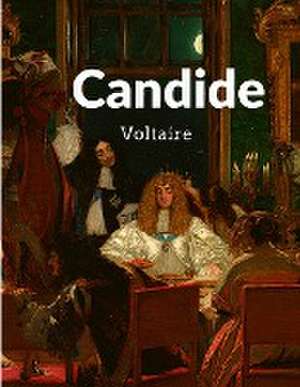Candide
Autor Voltaireen Limba Engleză Paperback – 12 dec 2022
Preț: 76.67 lei
Nou
14.67€ • 15.40$ • 12.18£
Carte disponibilă
Livrare economică 20 martie-03 aprilie
Specificații
ISBN-10: 1805470868
Pagini: 80
Dimensiuni: 216 x 280 x 5 mm
Greutate: 0.23 kg
Editura: Bookado
Notă biografică
Voltaire was a versatile and prolific writer, producing works in almost every literary form, including plays, poems, novels, essays, and historical and scientific works. He wrote more than 20,000 letters and more than 2,000 books and pamphlets.[10] He was an outspoken advocate of civil liberties, despite the risk this placed him in under the strict censorship laws of the time. As a satirical polemicist, he frequently made use of his works to criticize intolerance, religious dogma, and the French institutions of his day.
François-Marie Arouet was born in Paris, the youngest of the five children of François Arouet (1649-1722), a lawyer who was a minor treasury official, and his wife, Marie Marguerite Daumard (c. 1660-1701), whose family was on the lowest rank of the French nobility.[11] Some speculation surrounds Voltaire's date of birth, because he claimed he was born on 20 February 1694 as the illegitimate son of a nobleman, Guérin de Rochebrune or Roquebrune.[12] Two of his older brothers-Armand-François and Robert-died in infancy, and his surviving brother Armand and sister Marguerite-Catherine were nine and seven years older, respectively.[13] Nicknamed "Zozo" by his family, Voltaire was baptized on 22 November 1694, with François de Castagnère, abbé de Châteauneuf [fr], and Marie Daumard, the wife of his mother's cousin, standing as godparents.[14] He was educated by the Jesuits at the Collège Louis-le-Grand (1704-1711), where he was taught Latin, theology, and rhetoric;[15] later in life he became fluent in Italian, Spanish, and English.[16]
By the time he left school, Voltaire had decided he wanted to be a writer, against the wishes of his father, who wanted him to become a lawyer.[17] Voltaire, pretending to work in Paris as an assistant to a notary, spent much of his time writing poetry. When his father found out, he sent Voltaire to study law, this time in Caen, Normandy. But the young man continued to write, producing essays and historical studies. Voltaire's wit made him popular among some of the aristocratic families with whom he mixed. In 1713, his father obtained a job for him as a secretary to the new French ambassador in the Netherlands, the marquis de Châteauneuf [fr], the brother of Voltaire's godfather.[18] At The Hague, Voltaire fell in love with a French Protestant refugee named Catherine Olympe Dunoyer (known as 'Pimpette').[18] Their affair, considered scandalous, was discovered by de Châteauneuf and Voltaire was forced to return to France by the end of the year.
Descriere
Young Candide is ejected from his idyllic life in a protected castle and finds himself encountering wild adventures and harsh trials that put to the test his teacher's claim that we live in the best of all possible worlds.
Honest and simple to a fault, Candide finds that a bit of romance leads only to exile and sudden immersion in a larger and more frightening world. Armed with the optimistic teachings of his mentor Pangloss, he is soon astounded to be arrested, beaten and forced into military service. The author doesn't spare his hero, hurling him into a shipwreck, an earthquake, a tidal wave and a city-wide wildfire in short order. Pursuing his true love and reunited with Pangloss, who interprets each new setback, no matter how horrific, as another sign that everything happens for the best, Candide refuses to abandon hope but begins to question his teacher's bottomless optimism. An outrageous picaresque quest full of barbed observations about human behavior and belief, politics and institutions, Candide was condemned for the fiercely irreverent stance it delicately conceals beneath its hero's guileless nature and chain of extravagant adventures. Triumphing over censorship, the book has had profound influence on philosophy and politics since its first appearance in 1759, but remains a classic that can be read for pure pleasure.
With an eye-catching new cover, and professionally typeset manuscript, this edition of Candide is both modern and readable.

